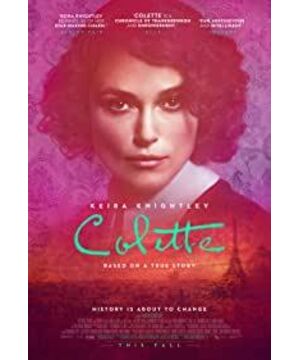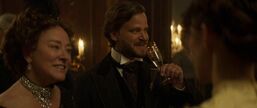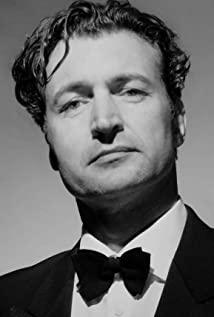The scenery in the movie is French, you can see the Seine and the Eiffel Tower. The costumes for the film are French, and you can see the style of fashion in the late 19th and early 20th centuries. The text of the film is French, and you can read the spelling of the Moulin Rouge and the smooth French written by the characters. But, if you put aside the year and location of the subtitles, I'd think I'd watched two hours of Jane Austen, or some other BBC period drama.
When the two leading actors read their own French sentences with a pleasant English accent, I couldn't be convinced that this was a biographical film about a French icon. It's just too British!
The director took Colette's life trajectory from the age of 18 to 34, from the beginning to Paris to breaking with her husband, to create, which is actually very smart. Because in these 16 years, I left my hometown and came to a prosperous city; I have grown from an innocent girl to a charming and confident woman; I have discovered my talent in simple writing and turned it into a mature creation; The love and reverence of her gradually degenerates into a sober renunciation. During this period, there are too many materials to play, and too many topics to explore. It is a pity that the film has become a simple narrative, with a lot of space depicting many fragments of Colette's life, what she did, who she met, and who she talked to, but she couldn't see her own. Thoughts and conclusions.
Whether it's a decision to ask a husband to sign his name on a book, or simply whether or not to meet a woman of interest, these personal decisions in the film are made with the participation of others. Friends say I know you are the real writer and you can publish in your own name; mother says you should leave the man because he will only hold you back; husband says you should agree to the woman's invitation because Obviously she's only interested in you. But what about Colette's own thinking? The film did not leave any pauses or blanks to allow the inner activities of the actors to be revealed. As an audience, I could not feel the psychological fluctuations of the most important heroine.
So in the end, the discussion of all the topics in the whole film seems superficial, because the independent thinking of the most inspiring woman is missing, and all her uniqueness is also deprived of it.
I really like the scene where Keira talks to her husband before the end of the movie, she asks why the stupid man in front of her is so shallow, so eager, so utilitarian, why he takes everything for granted. In this long shot, I only focus on Keira's face. When she recites this large monologue in an emotional tone, with her fluctuating tone, you can feel the catharsis of her inner complex emotions. For a moment, she was Colette. This short few minutes outweighs the countless number of previous pages.
But other than that, I still seem to have watched Elizabeth for more than 100 minutes, or the Elizabeth with British stubbornness and cleverness.
It is a pity that after "Still Alice", the director gave us a "Still Elizabeth".
(Personal film review public account: one onion and two whites)
View more about Colette reviews











